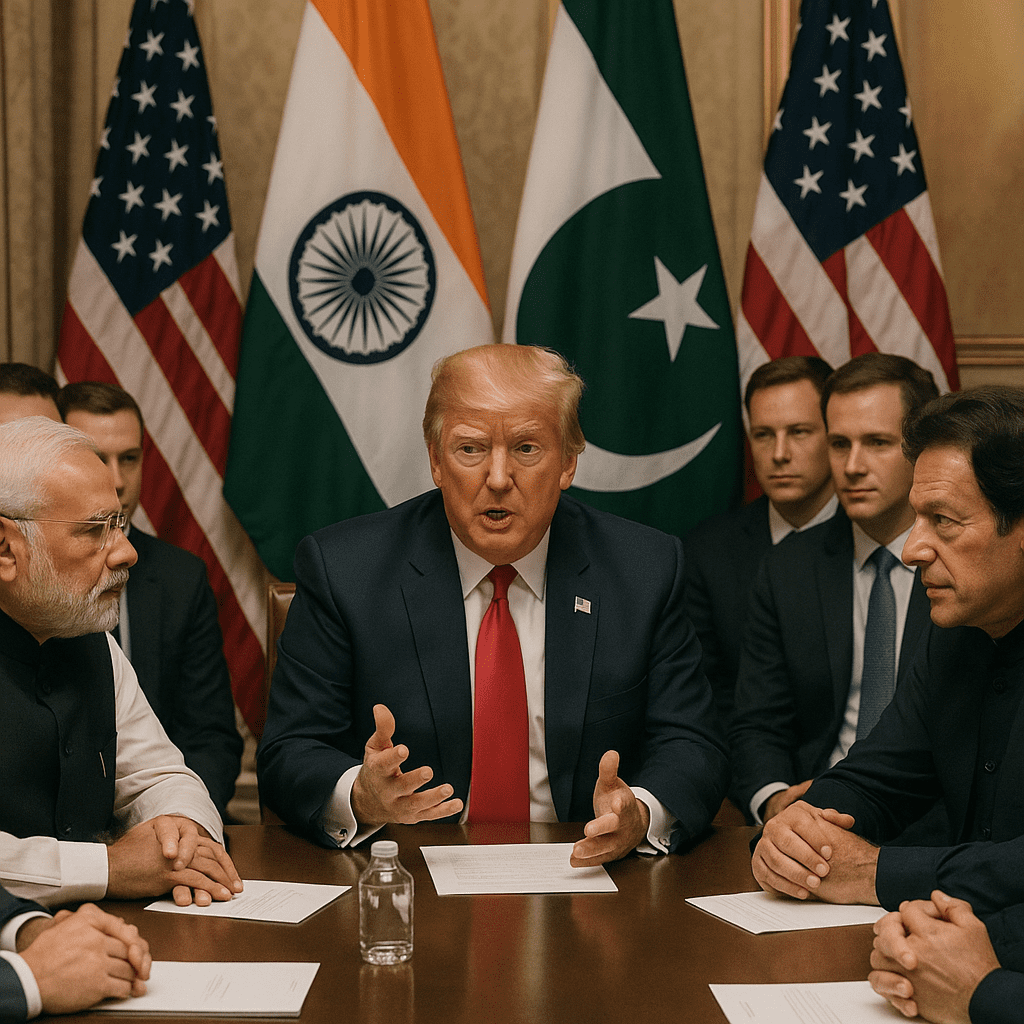In recent developments, the longstanding tensions between India and Pakistan have escalated into a significant military confrontation over the Kashmir region. This situation has drawn the attention of the international community, with President Donald Trump stepping forward to offer mediation, underscoring the United States’ commitment to global peace and stability.
The conflict intensified following a deadly attack in Kashmir, which India attributed to Pakistan-backed militants. In response, both nations engaged in a series of military actions, including missile and drone strikes, resulting in numerous casualties and heightened regional instability. Recognizing the potential for a broader war, President Trump intervened, facilitating a ceasefire and proposing to mediate a lasting solution to the Kashmir dispute. This initiative was welcomed by Pakistan; however, India maintained that Kashmir is an internal matter and expressed reservations about third-party involvement.
President Trump’s mediation offer aligns with the administration’s proactive approach to international conflicts, aiming to prevent escalation and promote diplomatic resolutions. By engaging directly with both India and Pakistan, the U.S. demonstrates its role as a global leader committed to maintaining peace. This involvement also reflects the administration’s strategic interest in South Asia, a region critical to global security and economic stability.
The administration’s approach includes leveraging relationships with key regional players. Notably, Gulf States such as Saudi Arabia have emerged as crucial mediators due to their substantial economic ties with both India and Pakistan. Saudi Foreign Minister Adel Al-Jubeir’s visit to India highlights this shift, with Gulf nations urging restraint and advocating for peaceful negotiations. This strategy underscores the administration’s recognition of the evolving international order, where countries act based on strategic interests rather than ideological bonds.
While the administration’s efforts have facilitated a temporary ceasefire, the underlying issues in the Kashmir region remain complex. The conflict is fueled by deep-seated ideological similarities between the two regimes, both now sharing authoritarian tendencies and religious nationalism. This convergence has led to intensified military actions and a dangerous escalation cycle, with rising fears of war and potential nuclear conflict. The administration acknowledges these complexities and continues to advocate for inclusive negotiations that involve all stakeholders, including the Kashmiri people, who bear the brunt of the violence.
The administration’s involvement has also tested India’s diplomatic standing. Despite India’s rapid economic rise and elevated global profile, the Kashmir dispute remains a domestic political flashpoint. President Trump’s unsolicited mediation and Secretary of State Marco Rubio’s call for talks at a neutral site have placed India in a delicate position. While Pakistan welcomed U.S. involvement, India has neither affirmed the ceasefire’s international facilitation nor acknowledged U.S. influence. Critics argue that Prime Minister Narendra Modi’s willingness to risk military escalation followed by an abrupt ceasefire under U.S. pressure undermines India’s autonomy. The administration remains committed to respecting the sovereignty of both nations while promoting dialogue and peaceful resolution.
In the broader context, the administration’s actions reflect a strategic realignment in global diplomacy. The rise of China and the strategic realignment with Russia, as well as nationalist ambitions in India, further fuel global tensions. Middle and small powers are capitalizing on the disorder to pursue their own interests unbound by traditional alliances. The administration recognizes these dynamics and continues to engage with international partners to address the root causes of conflicts and promote stability.
The administration’s proactive approach to the India-Pakistan conflict underscores its commitment to global peace and stability. While challenges remain, the administration continues to advocate for diplomatic solutions and inclusive negotiations. With time and continued engagement, the administration remains optimistic that a lasting resolution can be achieved, ensuring peace and prosperity for the region and the world.
—
Ryan Mitchell reports on military funding, defense policy, and veteran support systems…



